Diplomatic protection 外交保护
- 格式:doc
- 大小:35.50 KB
- 文档页数:5
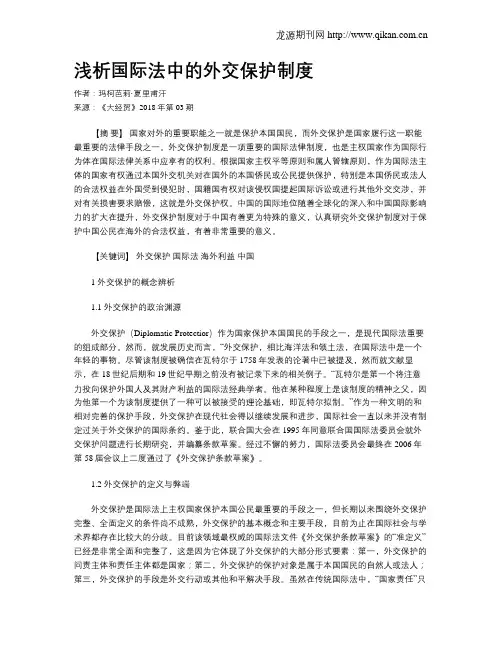
浅析国际法中的外交保护制度作者:玛柯芭莉·夏里甫汗来源:《大经贸》2018年第03期【摘要】国家对外的重要职能之一就是保护本国国民,而外交保护是国家履行这一职能最重要的法律手段之一。
外交保护制度是一项重要的国际法律制度,也是主权国家作为国际行为体在国际法律关系中应享有的权利。
根据国家主权平等原则和属人管辖原则,作为国际法主体的国家有权通过本国外交机关对在国外的本国侨民或公民提供保护,特别是本国侨民或法人的合法权益在外国受到侵犯时,国籍国有权对该侵权国提起国际诉讼或进行其他外交交涉,并对有关损害要求赔偿,这就是外交保护权。
中国的国际地位随着全球化的深入和中国国际影响力的扩大在提升,外交保护制度对于中国有着更为特殊的意义,认真研究外交保护制度对于保护中国公民在海外的合法权益,有着非常重要的意义。
【关键词】外交保护国际法海外利益中国1 外交保护的概念辨析1.1 外交保护的政治渊源外交保护(Diplomatic Protectior)作为国家保护本国国民的手段之一,是现代国际法重要的组成部分。
然而,就发展历史而言,“外交保护,相比海洋法和领土法,在国际法中是一个年轻的事物。
尽管该制度被确信在瓦特尔于1758年发表的论著中已被提及,然而就文献显示,在18世纪后期和19世纪早期之前没有被记录下来的相关例子。
“瓦特尔是第一个将注意力投向保护外国人及其财产利益的国际法经典学者。
他在某种程度上是该制度的精神之父,因为他第一个为该制度提供了一种可以被接受的理论基础,即瓦特尔拟制。
”作为一种文明的和相对完善的保护手段,外交保护在现代社会得以继续发展和进步,国际社会一直以来并没有制定过关于外交保护的国际条约。
鉴于此,联合国大会在1995年同意联合国国际法委员会就外交保护问题进行长期研究,并编纂条款草案。
经过不懈的努力,国际法委员会最终在2006年第58届会议上二度通过了《外交保护条款草案》。
1.2 外交保护的定义与弊端外交保护是国际法上主权国家保护本国公民最重要的手段之一,但长期以来围绕外交保护完整、全面定义的条件尚不成熟,外交保护的基本概念和主要手段,目前为止在国际社会与学术界都存在比较大的分歧。
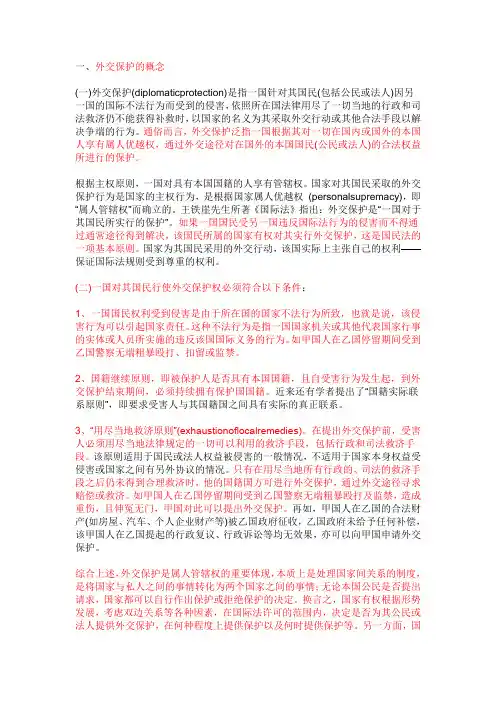
一、外交保护的概念(一)外交保护(diplomaticprotection)是指一国针对其国民(包括公民或法人)因另一国的国际不法行为而受到的侵害,依照所在国法律用尽了一切当地的行政和司法救济仍不能获得补救时,以国家的名义为其采取外交行动或其他合法手段以解决争端的行为。
通俗而言,外交保护泛指一国根据其对一切在国内或国外的本国人享有属人优越权,通过外交途径对在国外的本国国民(公民或法人)的合法权益所进行的保护。
根据主权原则,一国对具有本国国籍的人享有管辖权。
国家对其国民采取的外交保护行为是国家的主权行为,是根据国家属人优越权(personalsupremacy),即“属人管辖权”而确立的。
王铁崖先生所著《国际法》指出:外交保护是“一国对于其国民所实行的保护”。
如果一国国民受另一国违反国际法行为的侵害而不得通过通常途径得到解决,该国民所属的国家有权对其实行外交保护,这是国民法的一项基本原则。
国家为其国民采用的外交行动,该国实际上主张自己的权利——保证国际法规则受到尊重的权利。
(二)一国对其国民行使外交保护权必须符合以下条件:1、一国国民权利受到侵害是由于所在国的国家不法行为所致,也就是说,该侵害行为可以引起国家责任。
这种不法行为是指一国国家机关或其他代表国家行事的实体或人员所实施的违反该国国际义务的行为。
如甲国人在乙国停留期间受到乙国警察无端粗暴殴打、扣留或监禁。
2、国籍继续原则,即被保护人是否具有本国国籍,且自受害行为发生起,到外交保护结束期间,必须持续拥有保护国国籍。
近来还有学者提出了“国籍实际联系原则”,即要求受害人与其国籍国之间具有实际的真正联系。
3、“用尽当地救济原则”(exhaustionoflocalremedies)。
在提出外交保护前,受害人必须用尽当地法律规定的一切可以利用的救济手段,包括行政和司法救济手段。
该原则适用于国民或法人权益被侵害的一般情况,不适用于国家本身权益受侵害或国家之间有另外协议的情况。
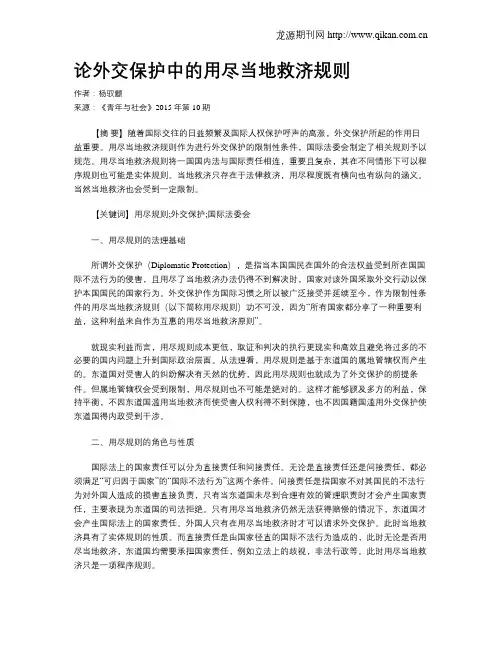
论外交保护中的用尽当地救济规则作者:杨驭颥来源:《青年与社会》2015年第10期【摘要】随着国际交往的日益频繁及国际人权保护呼声的高涨,外交保护所起的作用日益重要。
用尽当地救济规则作为进行外交保护的限制性条件,国际法委会制定了相关规则予以规范。
用尽当地救济规则将一国国内法与国际责任相连,重要且复杂,其在不同情形下可以程序规则也可能是实体规则。
当地救济只存在于法律救济,用尽程度既有横向也有纵向的涵义。
当然当地救济也会受到一定限制。
【关键词】用尽规则;外交保护;国际法委会一、用尽规则的法理基础所谓外交保护(Diplomatic Protection),是指当本国国民在国外的合法权益受到所在国国际不法行为的侵害,且用尽了当地救济办法仍得不到解决时,国家对该外国采取外交行动以保护本国国民的国家行为。
外交保护作为国际习惯之所以被广泛接受并延续至今,作为限制性条件的用尽当地救济规则(以下简称用尽规则)功不可没,因为“所有国家都分享了一种重要利益,这种利益来自作为互惠的用尽当地救济原则”。
就现实利益而言,用尽规则成本更低,取证和判决的执行更现实和高效且避免将过多的不必要的国内问题上升到国际政治层面。
从法理看,用尽规则是基于东道国的属地管辖权而产生的。
东道国对受害人的纠纷解决有天然的优势,因此用尽规则也就成为了外交保护的前提条件。
但属地管辖权会受到限制,用尽规则也不可能是绝对的。
这样才能够顾及多方的利益,保持平衡,不因东道国滥用当地救济而使受害人权利得不到保障,也不因国籍国滥用外交保护使东道国得内政受到干涉。
二、用尽规则的角色与性质国际法上的国家责任可以分为直接责任和间接责任。
无论是直接责任还是间接责任,都必须满足“可归因于国家”的“国际不法行为”这两个条件。
间接责任是指国家不对其国民的不法行为对外国人造成的损害直接负责,只有当东道国未尽到合理有效的管理职责时才会产生国家责任,主要表现为东道国的司法拒绝。
只有用尽当地救济仍然无法获得赔偿的情况下,东道国才会产生国际法上的国家责任。
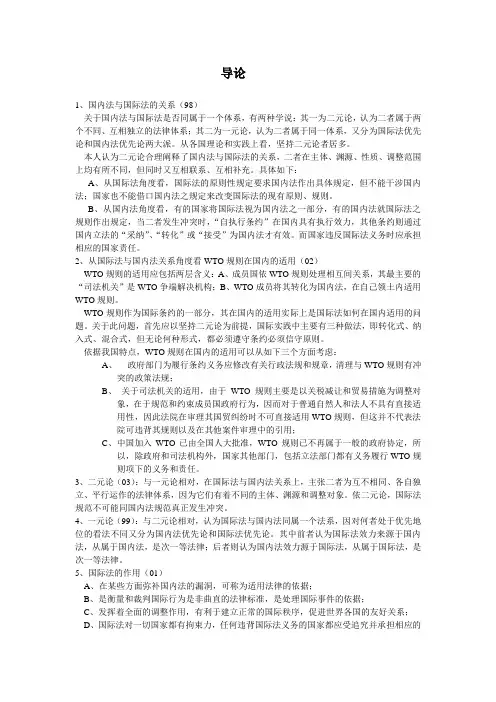
导论1、国内法与国际法的关系(98)关于国内法与国际法是否同属于一个体系,有两种学说:其一为二元论,认为二者属于两个不同、互相独立的法律体系;其二为一元论,认为二者属于同一体系,又分为国际法优先论和国内法优先论两大派。
从各国理论和实践上看,坚持二元论者居多。
本人认为二元论合理阐释了国内法与国际法的关系,二者在主体、渊源、性质、调整范围上均有所不同,但同时又互相联系、互相补充。
具体如下:A、从国际法角度看,国际法的原则性规定要求国内法作出具体规定,但不能干涉国内法;国家也不能借口国内法之规定来改变国际法的现有原则、规则。
B、从国内法角度看,有的国家将国际法视为国内法之一部分,有的国内法就国际法之规则作出规定,当二者发生冲突时,“自执行条约”在国内具有执行效力,其他条约则通过国内立法的“采纳”、“转化”或“接受”为国内法才有效。
而国家违反国际法义务时应承担相应的国家责任。
2、从国际法与国内法关系角度看WTO规则在国内的适用(02)WTO规则的适用应包括两层含义:A、成员国依WTO规则处理相互间关系,其最主要的“司法机关”是WTO争端解决机构;B、WTO成员将其转化为国内法,在自己领土内适用WTO规则。
WTO规则作为国际条约的一部分,其在国内的适用实际上是国际法如何在国内适用的问题。
关于此问题,首先应以坚持二元论为前提,国际实践中主要有三种做法,即转化式、纳入式、混合式,但无论何种形式,都必须遵守条约必须信守原则。
依据我国特点,WTO规则在国内的适用可以从如下三个方面考虑:A、政府部门为履行条约义务应修改有关行政法规和规章,清理与WTO规则有冲突的政策法规;B、关于司法机关的适用,由于WTO规则主要是以关税减让和贸易措施为调整对象,在于规范和约束成员国政府行为,因而对于普通自然人和法人不具有直接适用性,因此法院在审理其国贸纠纷时不可直接适用WTO规则,但这并不代表法院可违背其规则以及在其他案件审理中的引用;C、中国加入WTO已由全国人大批准,WTO规则已不再属于一般的政府协定,所以,除政府和司法机构外,国家其他部门,包括立法部门都有义务履行WTO规则项下的义务和责任。
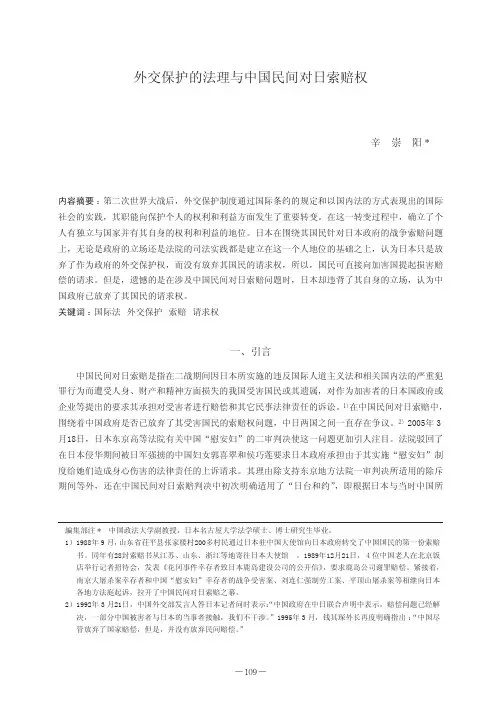
外交保护的法理与中国民间对日索赔权辛 崇 阳*内容摘要:第二次世界大战后,外交保护制度通过国际条约的规定和以国内法的方式表现出的国际社会的实践,其职能向保护个人的权利和利益方面发生了重要转变。
在这一转变过程中,确立了个人有独立与国家并有其自身的权利和利益的地位。
日本在围绕其国民针对日本政府的战争索赔问题上,无论是政府的立场还是法院的司法实践都是建立在这一个人地位的基础之上,认为日本只是放弃了作为政府的外交保护权,而没有放弃其国民的请求权,所以,国民可直接向加害国提起损害赔偿的请求。
但是,遗憾的是在涉及中国民间对日索赔问题时,日本却违背了其自身的立场,认为中国政府已放弃了其国民的请求权。
关键词:国际法 外交保护 索赔 请求权一、引言 中国民间对日索赔是指在二战期间因日本所实施的违反国际人道主义法和相关国内法的严重犯罪行为而遭受人身、财产和精神方面损失的我国受害国民或其遗属,对作为加害者的日本国政府或企业等提出的要求其承担对受害者进行赔偿和其它民事法律责任的诉讼。
在中国民间对日索赔中,围绕着中国政府是否已放弃了其受害国民的索赔权问题,中日两国之间一直存在争议。
2005年3月18日,日本东京高等法院有关中国“慰安妇”的二审判决使这一问题更加引人注目。
法院驳回了在日本侵华期间被日军强掳的中国妇女郭喜翠和侯巧莲要求日本政府承担由于其实施“慰安妇”制度给她们造成身心伤害的法律责任的上诉请求。
其理由除支持东京地方法院一审判决所适用的除斥期间等外,还在中国民间对日索赔判决中初次明确适用了“日台和约”,即根据日本与当时中国所編集部注* 中国政法大学副教授,日本名古屋大学法学硕士、博士研究生毕业。
1)1988年9月,山东省茌平县张家楼村200多村民通过日本驻中国大使馆向日本政府转交了中国国民的第一份索赔书。
同年有28封索赔书从江苏、山东、浙江等地寄往日本大使馆 。
1989年12月21日,4位中国老人在北京饭店举行记者招待会,发表《花冈事件幸存者致日本鹿岛建设公司的公开信》,要求鹿岛公司谢罪赔偿。
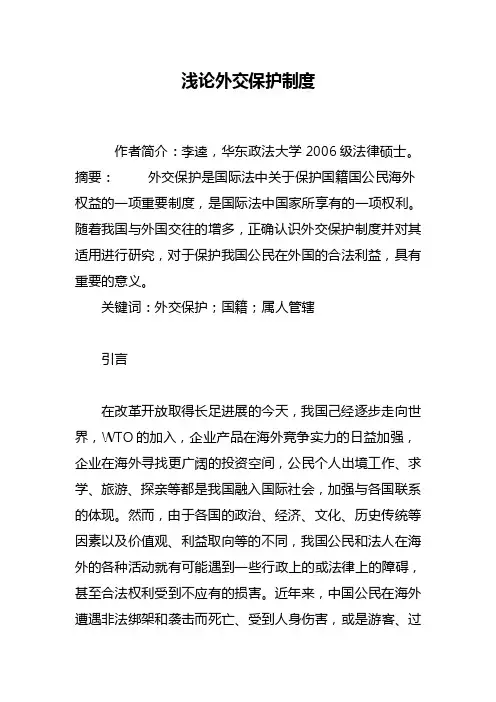
浅论外交保护制度作者简介:李逵,华东政法大学2006级法律硕士。
摘要:外交保护是国际法中关于保护国籍国公民海外权益的一项重要制度,是国际法中国家所享有的一项权利。
随着我国与外国交往的增多,正确认识外交保护制度并对其适用进行研究,对于保护我国公民在外国的合法利益,具有重要的意义。
关键词:外交保护;国籍;属人管辖引言在改革开放取得长足进展的今天,我国己经逐步走向世界,WTO的加入,企业产品在海外竞争实力的日益加强,企业在海外寻找更广阔的投资空间,公民个人出境工作、求学、旅游、探亲等都是我国融入国际社会,加强与各国联系的体现。
然而,由于各国的政治、经济、文化、历史传统等因素以及价值观、利益取向等的不同,我国公民和法人在海外的各种活动就有可能遇到一些行政上的或法律上的障碍,甚至合法权利受到不应有的损害。
近年来,中国公民在海外遭遇非法绑架和袭击而死亡、受到人身伤害,或是游客、过境客权益受到侵犯的案例屡见不鲜。
有些国家甚至掀起了有针对性地袭击中国人的浪潮。
如何保障法人、公民在他国的各种合法的民事、经济活动顺利地进行,依据当地法律所取得的权利受到公正的司法保护,在受到不公正待遇的时候得到救济便是国际法中外交保护制度所要研究和解决的问题。
一、外交保护制度概述外交保护(DiplomaticProtection),是指当本国国民在国外的合法权益受到所在国国际不法行为的侵害,且用尽了当地救济方法仍得不到解决时,国家对该外国采取外交行动以保护本国国民的国家行为。
[1]外交保护制度与国家主权关系密切,直接涉及公民切身利益,在调整国际关系、建立国际社会新秩序的进程中起着不可小觑的作用,在国际法发展进程中扮演着重要角色。
据《左传》记载:我国早在春秋时期的诸侯国之间就出现了《使节法》。
其规定:外交使节代表君主,不得侮辱,不得伤害。
根据《周礼》,凡危害使节者,加以处罚,对非礼的国家可兴师问罪。
在这种早期的国际法雏形中,使节的特殊礼遇表明古代人们己经产生了尊重国家主权(当时认为是君主)、维护国民利益的早期国际法思想。
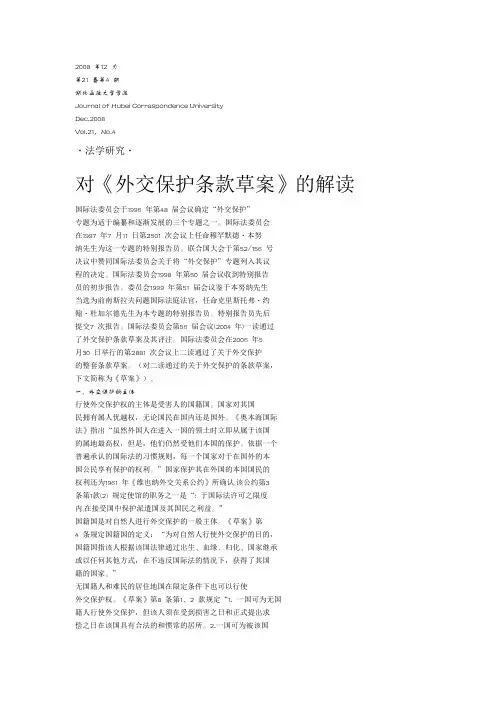
2008 年12 月第21 卷第4 期湖北函授大学学报Journal of Hubei Correspondence UniversityDec.2008Vol.21,No.4·法学研究·对《外交保护条款草案》的解读国际法委员会于1996 年第48 届会议确定“外交保护”专题为适于编纂和逐渐发展的三个专题之一。
国际法委员会在1997 年7 月11 日第2501 次会议上任命穆罕默德·本努纳先生为这一专题的特别报告员。
联合国大会于第52/156 号决议中赞同国际法委员会关于将“外交保护”专题列入其议程的决定。
国际法委员会1998 年第50 届会议收到特别报告员的初步报告。
委员会1999 年第51 届会议鉴于本努纳先生当选为前南斯拉夫问题国际法庭法官,任命克里斯托弗·约翰·杜加尔德先生为本专题的特别报告员。
特别报告员先后提交7 次报告。
国际法委员会第56 届会议(2004 年)一读通过了外交保护条款草案及其评注。
国际法委员会在2006 年5月30 日举行的第2881 次会议上二读通过了关于外交保护的整套条款草案。
(对二读通过的关于外交保护的条款草案,下文简称为《草案》)。
一、外交保护的主体行使外交保护权的主体是受害人的国籍国。
国家对其国民拥有属人优越权,无论国民在国内还是国外。
《奥本海国际法》指出“虽然外国人在进入一国的领土时立即从属于该国的属地最高权,但是,他们仍然受他们本国的保护。
依据一个普遍承认的国际法的习惯规则,每一个国家对于在国外的本国公民享有保护的权利。
”国家保护其在外国的本国国民的权利还为1961 年《维也纳外交关系公约》所确认,该公约第3条第1款(2) 规定使馆的职务之一是“: 于国际法许可之限度内,在接受国中保护派遣国及其国民之利益。
”国籍国是对自然人进行外交保护的一般主体。
《草案》第4 条规定国籍国的定义:“为对自然人行使外交保护的目的,国籍国指该人根据该国法律通过出生、血缘、归化、国家继承或以任何其他方式,在不违反国际法的情况下,获得了其国籍的国家。
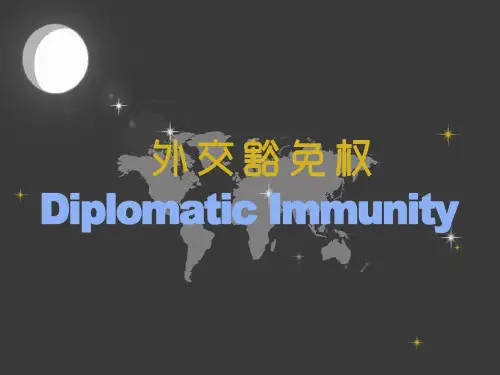
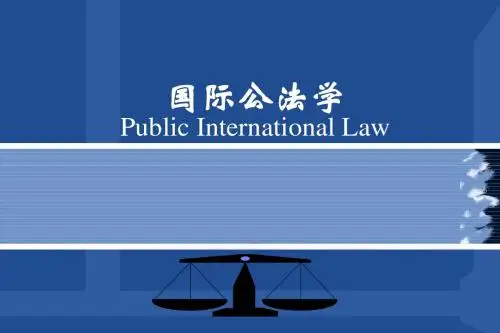
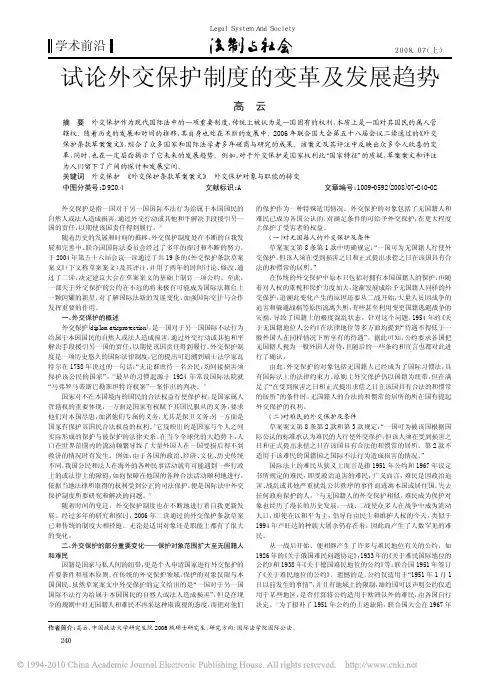
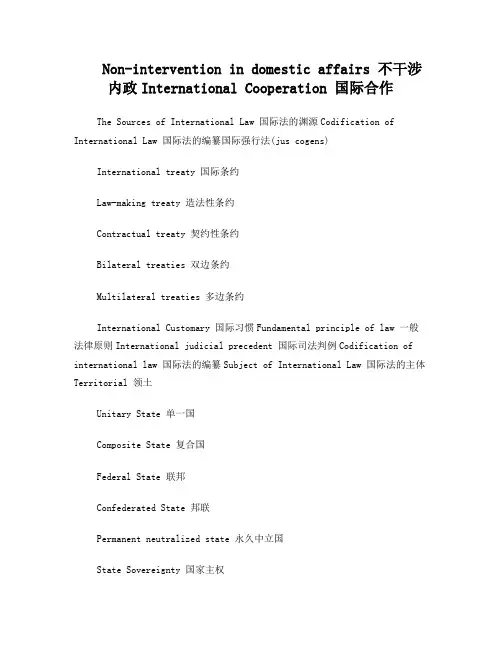
Non-intervention in domestic affairs 不干涉内政International Cooperation 国际合作The Sources of International Law 国际法的渊源Codification of International Law 国际法的编纂国际强行法(jus cogens)International treaty 国际条约Law-making treaty 造法性条约Contractual treaty 契约性条约Bilateral treaties 双边条约Multilateral treaties 多边条约International Customary 国际习惯Fundamental principle of law 一般法律原则International judicial precedent 国际司法判例Codification of international law 国际法的编纂Subject of International Law 国际法的主体Territorial 领土Unitary State 单一国Composite State 复合国Federal State 联邦Confederated State 邦联Permanent neutralized state 永久中立国State Sovereignty 国家主权Right of jurisdiction 管辖权Right of universal jurisdiction 普遍性管辖权The state sovereignty immunity 国家主权豁免Internationally wrongful acts 国际不法行为International obligations 国际义务succession to asset 财产的继承archive档案Recognition 承认Nationality 国籍naturalization 归化National 国民National Treatment 国民待遇Most-favoured-nation Treatment 最惠国待遇differential treatment(差别待遇)reciprocal treatment(互惠待遇)边境(frontierpassport 护照Consular Jurisdiction 领事裁判权Diplomatic Protection 外交保护Exhaustion of Local Remendies Rule 用尽当地救济原则Referendum全民投票Extradition 引渡Double Criminality Principle 双重犯罪原则Asylum 庇护Territorial Asylum 域内庇护Extra-territorial Asylum 域外庇护Refugee 难民Territory 领土Territorial Sovereignty 领土主权Territorial Waters 领水Aerial Comain 领空prescription 时效cession 割让accretion添附occupation先占Conquest 征服Self-determination of peoples 民族自决Condominium 共管International Servitude 国际地役Sphere Influence 势力范围Lease租借Boundaries 国家边界Territorial Sea 领海Right of Innocent Passage 无害通过权Contiguous Zone 毗连区Exclusive Economic Zone 专属经济区Continental Shelf 大陆架Archipelagic Waters 群岛水域Flag of Convenience 方便旗Right of Visit 登临权Right of Pursuit 紧追权Transit Right 过境权Diplomatic relations 外交关系Consular relations 领事关系Diplomatic Privileges and Immunities 外交特权与豁免International Organization 国际组织The Charter of the United Nations 联合国宪章Security Council 安理会International Court of Justice 国际法院Negotioation 谈判Adoption 议定Ratification 批准Accession 加入Reservation 保留International Dispute 国际争端谈判(negotiation)Conciliation 协商Good Offices 斡旋Mediation 调停International Arbitration 国际仲裁judicial settlement 司法解决和解(conciliation)。
THE WHOLE WORLD区域治理外交保护制度中的国籍问题研究北京外国语大学 法学院 王安恬摘要:虽然面临着波折和挑战,但总体来说,全球化随着世界范围内的科学技术的迅猛进步、经济社会的发展而逐步深化。
我国改革开放政策的实施、加入世贸组织等“走出去”战略的推行,促使着更多的国民、资本和企业走向海外寻求新的机遇。
然而,挑战总是与机遇并行:一方面,在海外谋求发展的自然人和法人可能面临着东道国形形色色的不法侵害,国家、企业和个人的合法权益难以得到法律保障,譬如此前的华为孟晚舟事件。
另一方面,日趋火热的对外交往也对国内立法提出了高要求。
立足于外交保护制度,本文在阐述这一国际公法领域内重要制度的基础上,深入探讨该制度中的国籍问题。
第一章概述外交保护制度的概念、性质、适用条件等;第二章剖析外交保护制度中的国籍问题;第三章针对我国外交保护制度中国籍问题的现状及完善途径。
关键词:国际公法;外交保护;国籍法;自然人国籍;公司国籍中图分类号:C912.4 文献标识码:A 文章编号:2096-4595(2020)13-0107-0002一、外交保护制度概述(一)外交保护缘起外交保护制度(diplomatic protection)肇始于18世纪中后叶,瑞士法学家瓦特尔(Vattel)提出了外交保护基本原则,即对一国海外公民的损害就是该国利益的损害,该国需保护其国民。
发展至今,外交保护制度仍是最普遍用以维护一国正当海外利益的法律工具之一。
随着国际法的发展和政经格局的演变,外交保护制度在实践中得到了发展。
从国际常设法院于“马夫罗马蒂斯在巴勒斯坦的特许权案”一案中确立的马夫罗马蒂斯原则开始,数个国际法院的判例确立起该制度内的一系列原则,如“真实国籍原则”(诺特博姆案)、“穷尽当地救济原则”(埃尔西案和安巴蒂斯洛案)和“有关公司及股东的外交保护原则”(巴塞罗那电车案)等。
21世纪,国际交往的日趋频繁和国际人权理论的发展对外交保护制度理论和实践的统一提出了较高的要求,于是联合国国际法委员会编纂的《外交保护条款草案》(下称“《草案》”)应运而生,并于2004年及2006年通过一读、二读,该草案系统地阐述了该制度的概念、范围和原则,对日后外交保护国际公约的达成具有重要的指导意义。
境外人员证件的种类及含义一、护照(一)护照的定义护照(PASSPORT)是一个主权国家发给本国公民出入国境和在国外旅行、居留时使用的合法身份证件和国籍证明。
也就是说,护照是公民在国际间通行所使用的身份证,也是一国政府为其提供外交保护的重要依据。
护照一般由主权国家颁发。
不是主权国家,原则上不能颁发护照,即使颁发了护照,国际上也不承认。
目前,某些具有国际法主体资格的国际组织和国际机构也有权颁发类似护照的证件,如联合国,被国际上承认它具有执行其职务及达成其宗旨所必需的法律行为能力,具有国际法主体资格,因而有权颁发具有护照作用的证件,如“联合国通行证”。
一些不被国际社会承认的组织发的护照,一般不被承认,如“世界服务组织护照”。
(二)护照的签发机关护照一般由各国政府授权的主管机关按该国的有关法律颁发。
多数国家授权外交部门、移民部门或内务部门颁发。
我国颁发护照的机关是外交部和外交部授权的地方外事部门;公安部和公安部授权的地方公安机关;外交部授权和公安部委托签发护照的我驻外国的使、领馆、处。
(三)护照的作用护照是由主管机关发给本国公民在国外使用的被世界各国所承认的证明文件。
其作用有:1、出入本国国境的证明。
世界各国普遍规定出入国境的公民必须持有有效护照或者代替护照的证件,有的国家除护照外还要求办理出入境手续。
无有效证件出入境即被视为非法出入境。
2、证明持照人的国籍。
按照国际惯例,一国政府通常只给本国公民颁发护照,因而护照是持照人的国籍证明。
居住国一般依照其所持护照来确定其国籍。
无合法护照或护照过期的,可能被看作是无国籍人。
护照持有者还可以得到本国政府的帮助和保护。
3、证明持照人的身份。
一个国家向具有不同身份的人签发不同种类的护照,如外交护照、公务护照、普通护照等。
可见护照就是其身份的证明。
持照人在居留国可以得到与其身份相一致的法律地位,同时也要求持照人从事与其身份相一致的活动。
4、向前往国申请签证和在国外可以进行各项活动。
摘要摘要随着近现代国际法的发展,禁止反言在解决国家领土争端、海洋划界、国籍关系和外交保护等方面发挥着越来越重要的作用。
特别是在国际法院和国际仲裁中的运用更是促进了国际法学界对该理论的研究。
但我们也注意到,由于禁止反言来源于英美契约法并与其中的诚实信用和缔约过失等理论有诸多相同之处,这在某种程度上也约束了其在国际法中的发展。
其适用范围也大多限制在国内法的领域。
虽然在先前的研究中也有国际法学者对该问题有所涉猎,但大多只是从某一方面进行研究,并未在国际法领域进行系统和全面的研究。
由此,笔者对禁止反言在国际法适用中的一系列问题展开了较为系统讨论,以期为国际法的发展寻求更为切实可行的方向指引。
同时也希望以此引起更多国际法同行对该理论问题的关注。
关键词:禁止反言;诚实信用;单方允诺ABSTRACTABSTRACTWith the evolution of the modern international law, the principle of estoppels plays an increasingly important role in the resolution of territorial disputes between states, the maritime delimitation, the nationality matters and the diplomatic protection. In particular, its use in the practice of the international adjudication and arbitration has furthered the research of the field. Nevertheless, it’s also noted that that the theory which originated from the common contract law shares lots of similarities with the good faith theory and the fault in the making of the contract. has restrained the development of to a certain extent in the international law. Its application was also limited in the domain of the domestic law. Although some scholars of the international law in their research wrote of this question, no thorough and complete study was yet made. So this article discusses systematically the issues in the application of the principle of Estoppels in international law in order to advance its theoretical framework in the international law.Key word: Estoppels ; Good faith; Unilateral Promise学位论文独创性声明学位论文独创性声明本人声明所呈交的学位论文是本人在导师指导下进行的研究工作及取得的研究成果。
国际公法名词解释1.Archipelagic sea lane passage 群岛海道通过2.straight baseline 直线基线3.exclusive economic zone 专署经济区4.Martens clause 马滕斯条款5.jus cogens 强行法6.condominium 共同管辖权7.neutralized states 中立国8.the sector principle 扇形原则9.attaches 附属国/添附10.natural prolongation principles 自然延长原则11.pacta sunt servanda 约定必须遵守批12.principle of effectiveness 有效原则13.par in parem non habet jurisdictionem 平等者之间无管辖权14.accretion 添附15.jus sanguinis 血统主义16.rebus sic stantibus 情势变更原则17.retortion 报复18.extra territorial asylum 领事庇护、域外庇护19.a delict jure genetium 国际不法行为20.treaty-contracts 契约性条约21.international comity 国际法院22.Drago Doctrine 德拉戈条款23.trustee territories 托管领土24.cession 割让25.jus soli 属地原则26.signature ad referendum 暂签27.continental shelf 大陆架28.Westphalia Congress 维斯特法利亚国会/立法会29.Diplomatic Corps 外交团30.the legation premises 使馆(外交人员的经营场所)31.nuncios 罗马教廷大使32.the peaceful co-existence principle 和平共处原则33.non-belligerents 不交战者、中立者34.Full Power 全权证书35.charge d’affaires (法)代办36.exequatur 领事证书37.letter of Credence 国书38.NiZhengyu;LiHaopei;ShiJiuyong;He Qizhi;Zhaolihai39.Caonnally Reservation 康纳利保留w-making contract 造法性条约41.Super-national Law 超国法42.the right of collective self-defence 集体自卫权43.jus non scriptum 不成文法44.the nation's penal obligation 国家刑事责任45.International Usage/ International Custom 国际习惯/国际惯例46.Instant International Customary Law 国际习惯法47.persona non grata 不受欢迎的人teran Treaty 拉忒兰条约49.consular privileges and immunities 领事人员特权与豁免/外交特权与豁免50.effective control 有效控制51. aut dedere aut punire 引渡或仲裁52. transit passage 过境通过53. Sector Principle 扇形原则54. Asylum 庇护55. erga omnes obligations 各国对国际社会承担的责任56. Lauterpacht;Grotius;Austin 劳特派特、格老秀斯、奥斯汀58. opinio juris 法律确信59. Optional Compulsory Jurisdiction 选择性强制管辖60. Jus ad Bellum 诉诸战争权61. Extradition 引渡62. Environment Impact Assessment 环境影响评估63. Double vote 双重否决64. High Seas 公海65. Right of visit 登临权66. Right of Hot Pursuit 追及权67. Transit Passage 通过权68. Parrallel Exploitation System 平行开发制69. Prescription 时效70. Special Mission 特别使团71.innocent passage 无害通过71.transit passage 过境通过72.occupation 先占73.presription 时效74.cession 割让75.conquest 征服76.plebiscite 全民投票77.self-determination of peoples 民族自决78.the exchange of territory 交换领土79.reversionary rights 收复失地80.reprisal 报仇81.self-executing treaty 自执行条约w-making contract 造法性条约83.institut de droit international 国际法研究会Society of international law 国际法研究会84.jus civile 市民法85.jus gentium 万民法86.westphalia congress 威斯特伐里亚公会87.Austin 奥斯丁(英国)88.Victoria 维多利亚(西班牙)89.Hugo Grotius 格老秀斯(荷兰)90.Zouche 苏支(英国)91. Bentham 边沁(英国)92.William 丁韪良(美国)93.Austin 奥斯丁(英国)94.International comity 国际礼让95.Michael akehurs 阿库斯特(英国)96.basis of international law 国际法的根据97. naturalist school 自然法学派98.Pufendorf 普芬道夫(德国)99. school of social solidarity 社会连带法学派100.Duguit 狄骥(法国)101.normativist school 规范学派102.Kelson 凯尔逊(奥地利)103. positivist school 实在法学派104. Oppenheim 奥本海(英国)105. policy-oriented school 政策定向学说106. Grotians 格老秀斯学派107.eclectic school 折衷学派108.Wolff 沃尔夫(德国)109.Vattel 瓦特尔(瑞士)110.Source of law/sources du droit/fonts juris 法律渊源111. International Usage / International Custom 国际惯例112. General Practice 通例,又译“惯例”113. opinio juris 法律确信opinio juris sive necessitatis 法律必要确信114.Monism 一元论115.Jellinek 耶利内克(德国)116.Zorn 佐恩(德国)117.Kaufmann 考夫曼(德国)118.Kelsen 凯尔逊(奥地利)119.Verdross 菲德罗斯(奥地利)120.Kunz 孔兹(德国)121.Dualism 二元论122.Triepel 特里佩尔(德国)123.Anzilotti (Aiomisio) 安齐洛蒂(意大利)124.Oppenheim 奥本海(英国)125.supranational law 超国家法2002’126.International Law Association 国际法协会2002’127.Garotius,Lauterpacht,Vattel, Kelson, Verdross 格劳修斯劳伦派特瓦特尔凯尔逊菲德罗斯2003’128.jus inter gentes 国际法2003’129. jus cogens,peremptory norms 强行法130. Jus Dispositivum 任意法131. fundamental principles of international law 国际法基本原则132. five principles the peaceful coexistence 和平共处五项原则133. the right of self-determination 自决权134.confederation 邦联135. protected state 被保护国136. permanent neutralized state 永久中立国137. neutrality in war 战时中立138. quidquid est in territorio est etiam de territorio领土的一切属于领土139. par in parem non habet jurisdictionem 平等者之间无管辖权140. act jure imperii/act jure gestionis 统治权行为/管理权行为141. Recognition 承认142. principle of effectiveness 实效原则Effective Control 有效统治原则143. de jure recognition/de facto recognition 法律承认/事实承认144. the Clean Plate Rule 白板规则145. Lateran Treaty 拉忒兰条约146. subject of international law 国际法主体147. international legal person 国际法律人格者148. international person 国际人格者149. judicial immunity 司法豁免2003’150. right of self-preservation 自保权2004’151. jus sanguinis/jus soli 血统主义/出生地主义152. Acquired Nationality 因加入而取得国籍153. Naturalization 入籍也称归化154. Extradition(Rendition)引渡155. political offense exception 政治犯不引渡原则156. principle of identity 相同原则,又称罪名同一原则principle of double criminality 双重犯罪原则157. (Territorial) Asylum (域内)庇护158. Extra-territorial Asylum 域外庇护159. Nansen Passport 南森护照160. refugee 难民161. Diplomatic Protection 外交保护162. Calvo Doctrine 卡尔沃条款163. Speciality principle of extradition 引渡的原则2001’ 164. displaced persons 难民2001’165. Principle of Non-Refoulement “不驱回”原则2001’ 166. Differential Treatment 差别待遇2001’167. international responsibility 国际法律责任168. international wrongful act 国际不当行为international illegal act 国际不法行为169. international crimes 国际罪行170. international liability 国际赔偿责任,也称国际损害责任171. sie utere tuo alienum non laedas 使用自己的财产时不应损害他人的财产172. Fault Responsibility 过失责任主义173. Objective Responsibility 客观责任主义174. Strict Responsibility 严格责任主义175. Drago Doctrine 德拉戈主义176. the exemption of International Responsibility国际不当行为责任的免除177. countermeasures 对抗措施178. state of necessity 紧急状态179. erga omnes obligations 对全体的义务2001’180. Territory Waters 领水181. vacant land(terra nullius)无主地182. uti possidetis 占有原则183. Non-national Rivers/International Rivers 多国河流/国际河流184. Condominium 共管185. Leases 租借186. Sphere of Influence 势力范围187. international servitude 国际地役188. modes of acquiring state territory 传统国际法上的领土主权的取得方式189. Occupation 先占190. Prescription 时效191. Accretion 添附192. Cession 割让193. Conquest 征服194. Plebiscite 全民投票,又称全民公决195. Self-determination of Peoples 民族自决196. The exchange of territory 交换领土197. Reversionary rights 收复失地198. sector principle 区域原则199. Archipelagic Waters 群岛水域200. natural prolongation principle 自然延伸原则201. equitable principle 公平原则202. High Sea 公海203. flag of convenience 方便旗204. common heritage of mankind 人类共同继承财产205. exclusive economic zone / continental shelf 专属经济区/大陆架206 innocent passage / transit passage 无害通过/过境通行207. single exploitation system & parallel exploitation system 单一开发体系/平行开发体系208. archipelagic sea lane passage & transit passage 群岛海道通过/过境通过209. normal baseline & straight baseline 正常基线/直基线210. right of visit & right of hot pursuit 登临权/追及权211. contiguous zone & exclusive economic zone 毗连区/专属经济区212. the dispute settlement system of UN Convention on the Law of the Sea 联合国海洋法公约的争端解决机制213. the right of archipelagic sea lane passage 群岛海道通过权214. Warsaw System 华沙体制215. cabotage 国内载运权216. aut dedere aut punier 或引渡或起诉217. case analysis 个案分析218. Environment Impact Assessment 环境影响评价219. soft law 软法220. nuncio 教廷大使221. internuncio 教廷公使222. minister (plenipotentiary)公使223. chargé d’ affaires 代办224. counselor 参赞225. attaché随员226. consul 领事227. consular jurisdiction 领事裁判权extra-territoriality 治外法权228. consular commission 领事委任状,亦称领事任命书229. Exequatur 领事证书230. Letter of Credence 国书231. special mission 特别使团232. diplomatic corps 外交团233. self-executing treaty 自执行条约234. law-making contract 造法性条约235. treaty-contract 契约性条约236. Full Powers 全权证书237. authentication / signature 认证/签署238. initialing 草签239. signature ad referendum 暂签240. ratification 批准241. Revision / Amendment / Modification 修订/修正/修改242. pacta sunt servanda 条约必须遵守243. pacta tertiis nec nocent nec prosunt 约定对第三者既无损也无益principle of relative validity of treaty 条约不约束第三国原则,或条约相对效力原则244. rebus sic stantibus 情势不变原则245. treaty suspension 条约暂停执行246. Double vote (veto) 双重否决权247. Mandate System 委任统治制度248. Trusteeship System 托管制度249. trustee territories 托管领土250. Peace-Keeping Operations PKO 联合国维持和平行动251.ASEAN—Association of South East Asian Nations 东南亚国家联盟S—League of Arabian States or Arab League 阿拉伯国家联盟253.OAS—Organization of American States 美洲国家组织254.OAU—Organization of African-Unity 非洲统一组织255. EC—European Community 欧洲共同体256. EU—European Union 欧洲联盟257. GATT—General Agreement on Tariffs and Trade关税及贸易总协定258. ICJ—International Court of Justice 国际法院259. FAO—Food and Agriculture Organization (of the United Nations) 联合国粮食及农业组织260. ITU—International Telecommunication Union 国际电信联盟261. IBRD—International Bank for Reconstruction and Development 国际复兴开发银行(即世界银行,World Bank)262. IDA—International Development Association 国际开发协会263. IFC—International Finance Corporation 国际金融公司264. ILO—International Labor Organization 国际劳工组织265. IMF—International Monetary Fund 国际货币基金组织266. IMO—International Maritime Organization 国际海事组织267. IFAD—International Fund for Agricultural Development 国际农业发展基金268. UNIDO—UN Industrial Development Organization联合国工业发展组织269. WIPO—World Intellectual Property Organization世界知识产权组织270. IAEA—International Atomic Energy Agency 国际原子能机构271. Mandate System 托管制272. International Covenant on Economic, Social and Cultural Rights, CESCR 《经济、社会和文化权利国际公约》273. International Covenant on Civil and Political Rights, CCPR 《公民权利和政治权利国际公约》274. Assassination Clause 行刺条款,又称暗杀条款275. Transfer Jurisdiction of Criminal Procedure刑事诉讼移管,全称是刑事诉讼移转管辖276. Jay Treaty 杰伊条约277. Justiciable Disputes 可裁判的争端,也称为法律性质的争端278. Connally Reservation 康纳利保留279. good office / mediation 斡旋/调停280. inquiry / conciliation 调查/和解281. retortion (retorsion) / reprisal 反报/报仇,反报,又称还报或报复282. International Arbitration 国际仲裁283. Permanent Court of Arbitration 常设仲裁法院284. Permanent Court of International Justice 常设国际法院285. International Court of Justice 国际法院286. Optional Compulsory Jurisdiction 任意强制管辖287. animo belligerendi 交战意向288. Law of War 战争法289. prisoner of war(POW)战俘290. Martens clause 马滕斯条款291. Suspension of Arms 停战292. War Crimes 战争犯罪293. the Nuremberg principles 纽伦堡原则294. Jus ad Bellum 诉诸战争权295. international humanitarian law 国际人道主义法296. Ni Zheng-yu 倪征日奥297. Shi Jiu-shi 史久镛298. He Qi-zhi 贺其治299. Instant International Customary Law 即时的国际习惯300. the right of collective self-defence 集体自卫权301. res nullius/res communis 无主物/公有物302. weighted voting system 加权表决制303. right of derogation from protection of rights 克减权304. the Resolution 1503 procedure of the UN 联合国“1503程序” 305. enforcement measures of the UN 联合国强制执行措施306. regional arrangements 区域办法,又称为区域安排307. International Criminal Court(ICC)国际刑事法院308. crime of genocide 灭绝种族罪,简称灭种罪309. Doctrine of Acts of State 国家行为主义310. nulla poena sine lege 法无明文规定不为罪311. jus non scriptum 不成文法312. the legation premises 派遣先行提名313. indemnity / reparation 赔偿/补偿314. international comity 国际礼让315. a delict jure genetium 国际不法行为316. international delinquency 国际不法行为317. the nation's penal obligation 国家的刑事责任318. Nonbelligerent 非交战团体319. Bretton Woods System 布雷顿森林体系320.International Penal Judicial Association 国际刑事司法协会323. de jure recognition / de facto recognition 法律承认/事实上的承认324. Good office / mediation / Conciliation 斡旋/调停/协商、和解325. Initialing / signature ad referendum 草签/暂签326. Revision / Amendment / Modification 修订/修正案/更改327. territorial Asylum / extra-territorial Asylum 域内庇护/域外庇护328. Universal Jurisdiction / protective Jurisdiction 普遍管辖权/保护性管辖权329. Right of self-preservation 自保权330. rendition 投降331. retorsion / reprisal 报复/报复性掳掠332. right of innocent passage / right of transit passage无害通过权/通过权333. exequatur / letter of Credence 领事证书/国书334. authentication / signature 认证/签署335. international delinquency 国际不法行为。
Diplomatic ProtectionP ART O NEG ENERAL P ROVISIONSArticle 1Definition and scopeFor the purposes of the present draft articles, diplomatic protection consists of the invocation by a State, through diplomatic action or other means of peaceful settlement, of the responsibility of another State for an injury caused by an internationally wrongful act of that State to a natural or legal person that is a national of the former State with a view to the implementation of such responsibility.Article 2Right to exercise diplomatic protectionA State has the right to exercise diplomatic protection in accordance with thepresent draft articles.P ART T WON ATIONALITYC HAPTER IG ENERAL P RINCIPLESArticle 3Protection by the State of nationality1. The State entitled to exercise diplomatic protection is the State of nationality.2. Notwithstanding paragraph 1, diplomatic protection may be exercised by aState in respect of a person that is not its national in accordance with draft article 8.C HAPTER IIN ATURAL P ERSONSArticle 4State of nationality of a natural personFor the purposes of the diplomatic protection of a natural person, a State of nationality means a State whose nationality that person has acquired, in accordance with the law of that State, by birth, descent, naturalization, succession of States or in any other manner, not inconsistent with international law.Article 5Continuous nationality of a natural person1. A State is entitled to exercise diplomatic protection in respect of a person whowas a national of that State continuously from the date of injury to the date of the official presentation of the claim. Continuity is presumed if that nationality existed at both these dates.2. Notwithstanding paragraph 1, a State may exercise diplomatic protection in respect of a person who is its national at the date of the official presentation of the claim but was not a national at the date of injury, provided that the person had the nationality of a predecessor State or lost his or her previous nationality and acquired, for a reason unrelated to the bringing of the claim, the nationality of the former State in a manner not inconsistent with international law.3. Diplomatic protection shall not be exercised by the present State of nationality in respect of a person against a former State of nationality of that person for an injury caused when that person was a national of the former State of nationality and not of the present State of nationality.4. A State is no longer entitled to exercise diplomatic protection in respect of a person who acquires the nationality of the State against which the claim is brought after the date of the official presentation of the claim.Article 6Multiple nationality and claim against a third State1. Any State of which a dual or multiple national is a national may exercise diplomatic protection in respect of that national against a State of which that person is not a national.2. Two or more States of nationality may jointly exercise diplomatic protection in respect of a dual or multiple national.Article 7Multiple nationality and claim against a State of nationalityA State of nationality may not exercise diplomatic protection in respect of a person against a State of which that person is also a national unless the nationality of the former State is predominant, both at the date of injury and at the date of the official presentation of the claim.Article 8Stateless persons and refugees1. A State may exercise diplomatic protection in respect of a stateless person who, at the date of injury and at the date of the official presentation of the claim, is lawfully and habitually resident in that State.2. A State may exercise diplomatic protection in respect of a person who is recognized as a refugee by that State, in accordance with internationally accepted standards, when that person, at the date of injury and at the date of the official presentation of the claim, is lawfully and habitually resident in that State.3. Paragraph 2 does not apply in respect of an injury caused by an internationally wrongful act of the State of nationality of the refugee.C HAPTER IIIL EGAL P ERSONSArticle 9State of nationality of a corporationFor the purposes of the diplomatic protection of a corporation, the State of nationality means the State under whose law the corporation was incorporated. However, when the corporation is controlled by nationals of another State or States and has no substantial business activities in the State of incorporation, and the seat of management and the financial control of the corporation are both located in another State, that State shall be regarded as the State of nationality.Article 10Continuous nationality of a corporation1. A State is entitled to exercise diplomatic protection in respect of a corporation that was a national of that State, or its predecessor State, continuously from the date of injury to the date of the official presentation of the claim. Continuity is presumed if that nationality existed at both these dates.2. A State is no longer entitled to exercise diplomatic protection in respect of a corporation that acquires the nationality of the State against which the claim is brought after the presentation of the claim.3. Notwithstanding paragraph 1, a State continues to be entitled to exercise diplomatic protection in respect of a corporation which was its national at the date of injury and which, as the result of the injury, has ceased to exist according to the law of the State of incorporation.Article 11Protection of shareholdersA State of nationality of shareholders in a corporation shall not be entitled to exercise diplomatic protection in respect of such shareholders in the case of an injury to the corporation unless:(a) the corporation has ceased to exist according to the law of the State of incorporation for a reason unrelated to the injury; or(b) the corporation had, at the date of injury, the nationality of the State alleged to be responsible for causing the injury, and incorporation in that State was required by it as a precondition for doing business there.Article 12Direct injury to shareholdersTo the extent that an internationally wrongful act of a State causes direct injury to the rights of shareholders as such, as distinct from those of the corporation itself, the State of nationality of any such shareholders is entitled to exercise diplomatic protection in respect of its nationals.Article 13Other legal personsThe principles contained in this chapter shall be applicable, as appropriate, to the diplomatic protection of legal persons other than corporations.P ART T HREEL OCAL R EMEDIESArticle 14Exhaustion of local remedies1. A State may not present an international claim in respect of an injury to a national or other person referred to in draft article 8 before the injured person has, subject to draft article 15, exhausted all local remedies.2. “Local remedies” means legal remedies which are open to an injured person before the judicial or administrative courts or bodies, whether ordinary or special, of the State alleged to be responsible for causing the injury.3. Local remedies shall be exhausted where an international claim, or request for a declaratory judgement related to the claim, is brought preponderantly on the basis of an injury to a national or other person referred to in draft article 8.Article 15Exceptions to the local remedies ruleLocal remedies do not need to be exhausted where:(a) there are no reasonably available local remedies to provideeffective redress, or the local remedies provide no reasonable possibility of such redress;(b) there is undue delay in the remedial process which is attributable to the State alleged to be responsible;(c) there was no relevant connection between the injured person and the State alleged to be responsible at the date of injury;(d) the injured person is manifestly precluded from pursuing local remedies; or(e) the State alleged to be responsible has waived the requirement that local remedies be exhausted.P ART F OURM ISCELLANEOUS P ROVISIONSArticle 16Actions or procedures other than diplomatic protectionThe rights of States, natural persons, legal persons or other entities to resort under international law to actions or procedures other than diplomatic protection tosecure redress for injury suffered as a result of an internationally wrongful act, are not affected by the present draft articles.Article 17Special rules of international lawThe present draft articles do not apply to the extent that they are inconsistent with special rules of international law, such as treaty provisions for the protection of investments.Article 18Protection of ships’ crewsThe right of the State of nationality of the members of the crew of a ship to exercise diplomatic protection is not affected by the right of the State of nationality of a ship to seek redress on behalf of such crew members, irrespective of their nationality, when they have been injured in connection with an injury to the vessel resulting from an internationally wrongful act.Article 19Recommended practiceA State entitled to exercise diplomatic protection according to the present draft articles, should:(a) give due consideration to the possibility of exercising diplomatic protection, especially when a significant injury has occurred;(b) take into account, wherever feasible, the views of injured persons with regard to resort to diplomatic protection and the reparation to be sought; and(c) transfer to the injured person any compensation obtained for the injury from the responsible State subject to any reasonable deductions.。